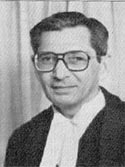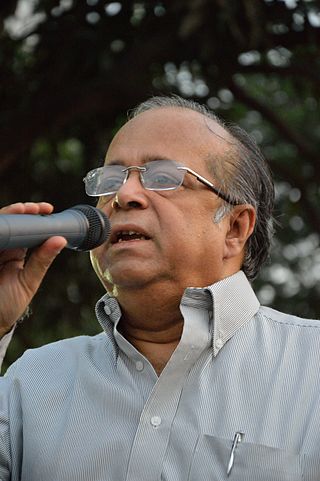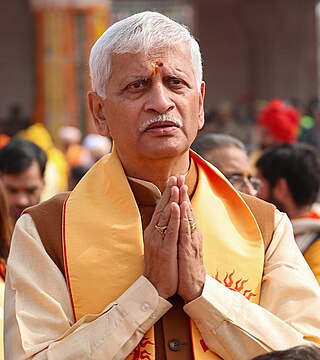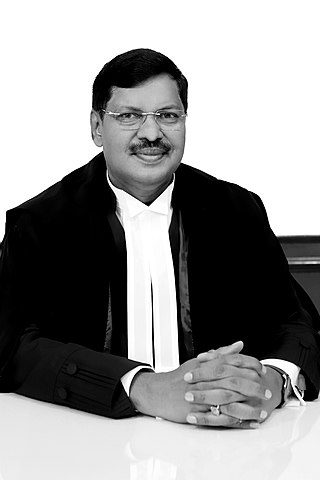Related Research Articles

The Supreme Court of India is the supreme judicial authority and the highest court of the Republic of India. It is the final court of appeal for all civil and criminal cases in India. It also has the power of judicial review. The Supreme Court, which consists of the Chief Justice of India and a maximum of fellow 33 judges, has extensive powers in the form of original, appellate and advisory jurisdictions.

The High Court of Bombay is the high court of the states of Maharashtra and Goa in India, and the union territory of Dadra and Nagar Haveli and Daman and Diu. It is seated primarily at Mumbai, and is one of the oldest high courts in India. The High Court has circuit benches at Nagpur and Aurangabad in Maharashtra and Porvorim,
Bellur Narayanaswamy Srikrishna is an Indian jurist and a retired judge of the Supreme Court of India. From 1993 to 1998, he headed the "Srikrishna Commission" that investigated causes and apportioned blame for the Bombay riots of 1992–93. In 2010, he headed the "Srikrishna Committee" that was constituted to look into the demand for separate statehood for Telangana. He is the chairman of the Financial Sector Legislative Reforms Commission (FSLRC) and also works as an independent arbitrator.

Sam Piroj Bharucha is the former Chief Justice of India, serving from November 2001 until his retirement in 2002.

Mohammad Hidayatullah was the 11th Chief Justice of India serving from 25 February 1968 to 16 December 1970, and the sixth vice president of India, serving from 31 August 1979 to 30 August 1984. He had also served as the acting president of India from 20 July 1969 to 24 August 1969 and from 6 October 1982 to 31 October 1982 and from 25 July 1983 to 25 July 1983 and from 25 July 1984 to 25 July 1984. He is regarded as an eminent jurist, scholar, educationist, author and linguist.

Sir Harilal Jekisundas "H. J." Kania was the first Chief Justice of India. He served as the Chief Justice of India from 1950 to 1951. He died while serving in office in 1951.
Veeraswami Ramaswami is an Indian retired judge of the Supreme Court of India and the first judge against whom removal proceedings were initiated in independent India.

Sarosh Homi Kapadia was the 38th Chief Justice of India. He was the first chief justice born after the partition of India.

Dalveer Bhandari is an Indian jurist. He is currently one of the judges of the International Court of Justice. He is a former judge of the Supreme Court of India and former chief justice of the Bombay High Court, he was also a judge of the Delhi High Court.

Asok Kumar Ganguly is an Indian jurist. He served as the chairman of the West Bengal Human Rights Commission and as a judge of the Supreme Court of India who delivered judgements in some high-profile cases like the 2G spectrum case.

Ranjan Gogoi is an Indian former advocate and judge who served as the 46th Chief Justice of India from 2018 to 2019, having previously served as a Judge of the Supreme Court of India from 2012 to 2018. He is currently a Member of the Rajya Sabha, having been nominated by President Ram Nath Kovind on 16 March 2020. Gogoi served as a judge in the Gauhati High Court from 2001 to 2010, and then was transferred as a judge to the Punjab and Haryana High Court from 2010 to 2011 where he later was the Chief Justice from 2011 to 2012. He is also a member of the Committee on External Affairs in the Rajya Sabha.

Dipankar Datta is a judge of the Supreme Court of India. He is the former chief justice of the Bombay High Court and a judge of the Calcutta High Court.

Sharad Arvind Bobde is an Indian judge who served as the 47th Chief Justice of India from 18 November 2019 to 23 April 2021.

Uday Umesh Lalit is an Indian lawyer and former Supreme Court Judge, who served as the 49th Chief Justice of India. Previously, he has served as a judge of Supreme Court of India. Prior to his elevation as a judge, he practised as a senior counsel at the Supreme Court. Justice Lalit is one of the eleven senior counsels who have been directly elevated to the Supreme Court. He is currently ‘Distinguished Visiting Professor’ at Ashank Desai Centre for Policy Studies, Indian Institute of Technology, Bombay and Distinguished Visiting Professor at West Bengal National University of Juridical Sciences.

Ajay Manikrao Khanwilkar is former judge of the Supreme Court of India who is currently serving as the Chairperson of Lokpal of India. He has also served as the chief justice of the Madhya Pradesh High Court and Himachal Pradesh High Court and as a judge of the Bombay High Court.
Ashok Abhaiendra Desai was a former judge of the Bombay High Court and the Allahabad High Court. He also served as the first chief justice of the Uttarakhand High Court between 2000 and 2003.
Bisheshwar Prasad Singh is an Indian Judge and former Judge of Supreme Court of India.
Dinshah Pirosha Madon was an Indian judge who served on the Supreme Court of India.

Justice Bhushan Ramkrishna Gavai is a judge of Supreme Court of India. He is a former judge of the Bombay High Court and currently serves as the chancellor of the Maharashtra National Law University, Nagpur. He is set to become the 52nd Chief Justice of India if the seniority convention is followed.
Ashok Chhotelal Agarwal was an Indian Judge and former Chief Justice of Madras High Court.
References
- ↑ "Former Judges". Archived from the original on 7 January 2019. Retrieved 7 January 2019.
- ↑ Aug 1999 (August 1999). "Competition Science Vision". Archived from the original on 27 February 2023. Retrieved 7 January 2019.
{{cite web}}: CS1 maint: numeric names: authors list (link) - ↑ "SC judges". The Tribune. India. 14 March 2000. Archived from the original on 2 September 2020. Retrieved 7 June 2019.
- ↑ "Hon'ble Mr. Justice S.N. Variava". Archived from the original on 14 November 2011. Retrieved 7 January 2019.